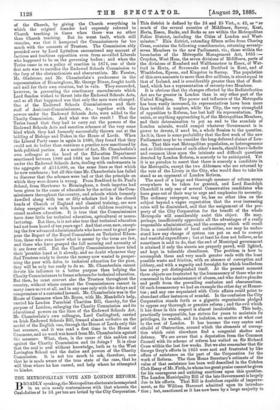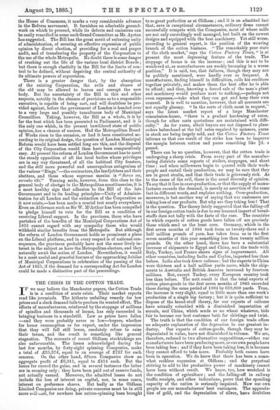however, in preventing the reactionary amendments which It is obvious
that the changes effected by the Redistribution Lord Bandon wished to thrust into the Endowed Schools Acts, Act are far greater in London than in any other part of the and so all that happened was that only the men were changed. United Kingdom. The power and influence of the Metropolis One of the Endowed Schools Commissioners and their has been vastly increased, its representatives have been more staff of Assistant-Commissioners, &c., together with the than trebled in number, while the City, the very stronghold powers under the Endowed Schools Acts, were added to the of opposition to Reform, has lost half its representation. The Charity Commission. And what was the result I That the union, or anything approaching it, of the Metropolitan Members, Tories found that they had to carry out the powers of the and their determination to put an end to the scandals of Endowed Schools Acts and sanction schemes of the very same London misrule, would compel whatever Government is in kind which they had formerly successfully thrown out at the power to devote, if need be, a whole Session to the question. bidding of Bishops and Dukes in the House of Lords. When As it is, there is some probability that the first work of the new the Liberal Party came in again in 1880, they found that they Parliament may be to consider the long-deferred claims of Lon- could not do better than continue a practice now sanctioned by don. That this vast Metropolitan population, so heterogeneous both political parties. As a matter of fact, Mr. Chamberlain's and so little conscious of each other's needs, should have definite own colleague at the head of the Education Department and common ideas upon the intricate and difficult questions sanctioned between 1880 and 1884 no less than 203 schemes denoted by London Reform, is scarcely to be anticipated. Yet under the Endowed Schools Acts, dealing with endowments in it is no paradox to assert that there is scarcely a candidate in the aggregate of £114,000, on the same lines as that which the Metropolis, except the two Aldermen who are returned by he now condemns ; but all this time Mr. Chamberlain has failed the vote of the Livery in the City, who would dare to take his to discover that the schemes were bad or that the principle on stand as an opponent of London Reform.
The London Municipality Bill of the late Government is largely the House of Commons, it marks a very considerable advance in the Reform movement. It furnishes an admirable ground- work on which to proceed, while its defects and omissions can be easily remedied in some such Grand Committee as Mr. Ayrton has suggested. The Bill has the great merit of enforcing unity of administration, of securing an effective expression of public opinion by direct election, of providing for a real and proper audit, and of transferring the property of the Corporation to the use of the whole Metropolis. No doubt there is some danger of crushing out the life of the various local district Boards ; but there is enough elasticity in the Bill for the limits of con- trol to be defined, without depriving the central authority of its ultimate powers of supervision. There is a greater danger that, by the absorption of the existing Corporation, the evils and abuses of the old may be allowed to leaven and corrupt the new body. But the uncertainty of the Bill in this and other respects, notably in the absence of provisions as to a responsible executive, is capable of being met, and will doubtless be pro- vided against, before the government of London is handed over to a very large and possibly tumultuous body of Municipal Councillors. Taking, however, the Bill as a whole, it is by far the best which has been presented to Parliament, and it is the only one which, in the present bewildered state of public opinion, has a chance of success. Had the Metropolitan Board of Works risen to the occasion, or had it been constituted ac- cording to its original design, the question of London Municipal Reform would have been settled long ere this, and the disposal of the City Corporation would then have been comparatively easy. At present the reform of London Government has to meet the steady opposition of all the local bodies whose privileges are in any way threatened, of all the habitual City feasters, and the still more powerful and unscrupulous antagonism of the various "Rings,"—the contractors, the landjobbers and their abettors, and those whose supreme maxim is "Servo me, servabo tibi." Turning aside, however, from this class to the general body of electors in the Metropolitan constituencies, it is a most healthy sign that adhesion to the Bill of the late Government and to its leading principles—Unity of Adminis- tration for all London and the extinction of the Corporation as it now exists,—has been made a crucial test nearly everywhere. Even an Alderman such as Sir W. M'Arthur has been compelled to pledge himself to vote for the Bill as a condition of receiving Liberal support. In the provinces, those who have partaken of the benefits of the Municipal Corporations Act of 1835 cannot regard with any sympathy those who would withhold similar benefits from the Metropolis. But although the reform of London Government holds so prominent a place on the Liberal platform, and in every respect is of national con- sequence, the provinces probably have not the same lively in- terest in the subject as have the Metropolitan electors, and they naturally await the action of London. Nevertheless, it would be a moat useful and graceful feature of the approaching Jubilee of Municipal Corporations in celebration of the passing of the Act of 1835, if the demand for a corresponding Act for London could be made a distinctive part of the proceedings.



































 Previous page
Previous page